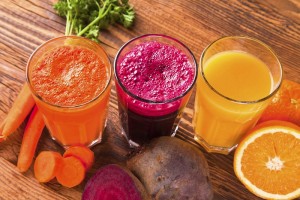The Facts on Juice Fasts
Juice fast enthusiasts have claimed that juicing—which requires a steady consumption of only fruit and vegetable juice to obtain nutrition—can flush the body of toxins, improve digestion and skin clarity, boost energy and weight loss, and cure common illnesses such as headaches and insomnia.
But are these claims too good to be true? Laura M. Rosch, DO, an osteopathic internist from Wheaton, Illinois, answers this question and tells us what we should know before starting a new health routine.
Doctors of Osteopathic Medicine, or DOs, look beyond your symptoms to understand how lifestyle and environmental factors affect your wellbeing. They listen and partner with you to help you get healthy and stay well. They also encourage your body’s natural tendency toward self-healing.
Are Juice Fasts Healthy?
“Juice fasts are not a good way to achieve long-term weight loss or proper nutrition,” says Dr. Rosch. “Done occasionally for a few days, juice fasts are not harmful; however, done regularly for a week or more at a time, they can begin to put a lot of stress on the body,” she warns. “Consumers should keep in mind that most of the claims associated with juice fasts are not scientifically proven. In fact, the major claim of removing toxins from the body is overstated,” says Dr. Rosch.
Juice contains little fiber and lacks sufficient protein or fat to be consumed on its own long-term.
Dr. Rosch notes that the digestive system is self-cleaning and naturally removes toxins. “Instead of removing toxins, juice fasts can deprive your body of essential proteins, vitamins, and nutrients, resulting in symptoms such as cravings, fatigue, irritability, headaches, pains, nausea, and vomiting,” she explains.
Dr. Rosch advises those on medications, pregnant women, and diabetics, who can experience dangerous spikes and crashes in blood sugar levels, to leave juice fasts alone; and if you’re curious about trying one, she recommends speaking with your physician first.
Can a Juice Fast Aid Weight Loss?
“A juice fast is not the best way to lose weight,” says Dr. Rosch. “You’re only losing water weight, which can yo-yo back and forth,” she explains.
Many people use juice fasts as a quick fix for weekend-long calorie binges or an excuse to overeat. Dr. Rosch warns against this use as it can spiral into an eating disorder.
“It is good to include juice in your diet; however, juice contains little fiber and lacks sufficient amounts of proteins or fats to be consumed on its own long-term, so it should not be your main meal or source for nutrients,” she says.
If you are trying to lose weight or just improve your health, your doctor can be a great partner during the process. Your physician can determine the best foods for your diet and help monitor your health so you lose weight in an effective and safe way.
